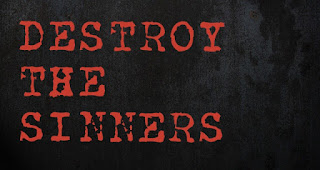How to Handle the 'Sinners will be Destroyed' Verses
Trying to get good
theology on Facebook is like trying to get good relationship advice on daytime
television – you’ll be lucky if it happens.
Yet many of us – when asked about the essentials of the faith we profess – give answers
that sound as if they were read from a meme on our newsfeed. Pop-culture Christianity is producing
Christians who are high in enthusiasm but who handle their Bibles about as well
as they do a unicycle on an oil slick.
This is
understandable when someone is a new Christian – learning takes time and effort.
But it should not stay this way. We're commanded to ‘correctly handle the word
of truth’ (2 Tim 2.15) – so this is not just an unfortunate situation, it’s a
matter of disobedience.
Our Biblical ignorance is no more
evident than when we come face to face with the ‘destroy the sinner’
verses. We have some of these in the New Testament, but the bulk and the best
known are in the Old. Some Christians manifest all the backbone of a gummy worm when challenged by outsiders with 'horrid' verse like,
All sinners will be destroyed; there will be no
future for the wicked. –Psalm 37
Or,
The day of the LORD is coming --a cruel day, with
wrath and fierce anger-- to make the land desolate and destroy the sinners
within it. –Isaiah 13
People who aren’t Christians tend to see such verses as harsh. But when they ask us
about it, we fail to give them a clear and confident reply. Instead we drink
a cowardice / ignorance cocktail, get all apologetic, and then try to explain that
the verse doesn’t mean what it obviously says.
We hum and haw and
mutter something about it being in the Old Testament, that God was a bit
immature back then, and that he had a short temper. But now he’s cool and has picked up
some hippy love – so we don’t need to be afraid. ‘Sorry for the
misunderstanding – I hope the big bad verse didn’t hurt your ego.’
We need to stop
saying sorry for the Bible and take our Scripture like we take our whisky –
straight up.
Destroy all the Sinners
Some are surprised
to find such verses in the Bible – thinking they are better suited to the
Koran. But Mohammad’s deity only calls for the destruction of bad sinners. The Bible – by contrast – declares the destruction
of all sinners.
In the Bible, God
is seen as being far more holy than in any of Mohammed's fiery sermons.
We’re naughty by
nature and must – and will - be destroyed. This is the very beginning of
Christian theology and if we don’t understand this, we really don’t understand
jack. In the second chapter of the Bible God declares
‘You must not eat from the tree of the knowledge of
good and evil, for when you eat from it you will certainly die.’ –Genesis
2
Saying that sinners
will die for their sin is one of the first utterances God gives to humanity.
Eve and Adam direct
their hearts from God and eat the one forbidden fruit – and we their children
do the same. The appropriate consequence is that we’re doomed to rot, like old
fruit in the sun.
Why this is Good News
The ‘Good News’ of
the New Testament does not negate the fact that sinners must die. Rather, Christ’s
death and his resurrection give us a new way to die. The good news is that we
can be destroyed – and as sinners we desperately need to be – and then made
again. Jesus didn’t just die so that we can live – he died so that we can die.
Read carefully what
Paul writes here,
If we have been united with him in a death like
his, we will certainly also be united with him in a resurrection like his. For
we know that our old self was crucified with him so that the body ruled by sin
might be done away with, that we should no longer be slaves to sin— because
anyone who has died has been set free from sin. –Romans
6
All sinners will be
destroyed. This is good news for a Universe that’s had to deal with our moral sewage
for long enough. But Jesus now also makes it good news for us as well – in him
we can be destroyed as sinners, and raised up in a new and pure life.
Jesus was the only
one who’s ever lived who perfectly worshipped God and never ate the fruit. He
is the new and better Adam. He’s the only one who didn’t have to face
destruction but who – in love - submitted himself to destruction for our sake.
If we identify with
him in death, then we will be with him in resurrection. The seed will die, but
it will not rot in the ground. It will grow and bear new life.
In Christ, we can - and must - embrace death like an old friend.
_____________________
[Please Share]
Or see the related post The Old Testament Problem




Comments
Post a Comment